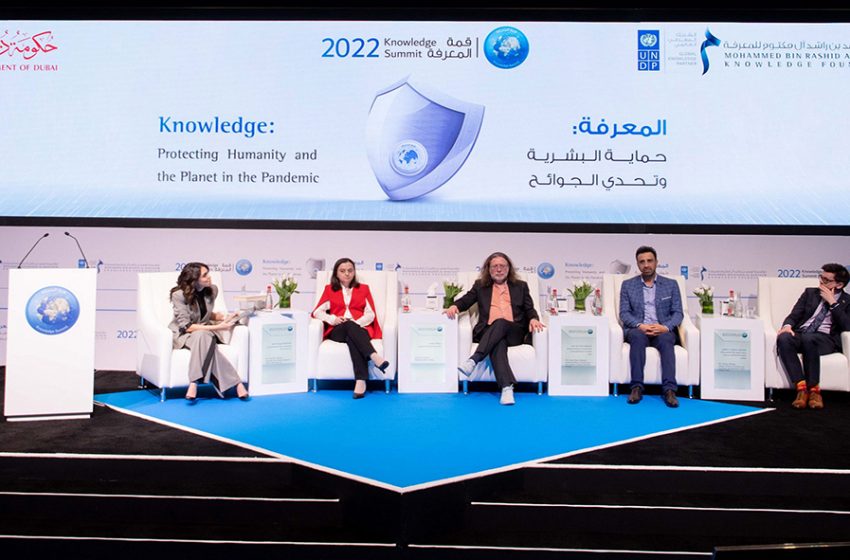Knowledge Space examines future outlooks, the importance of databases, dissemination of knowledge in a non-traditional way

DUBAI, United Arab Emirates, 18 March 2022 – On the second day of Knowledge Summit, a series of discussions sessions were held at the ‘Knowledge Space’ on several leading issues, including disseminating knowledge in non-traditional ways, the importance of databases, and the power and impact of media.
The Future of Knowledge Foresight Report 2022 and the Global Knowledge Index 2021 was also reviewed during the Knowledge Space sessions, which were held parallel to the main Knowledge Summit, organized by Mohammed bin Rashid Al Maktoum Knowledge Foundation (MBRF) in collaboration with the United Nations Development Program (UNDP).
The Researcher Disseminating Knowledge in Non-Traditional Ways
Themed “Disseminating knowledge in non-traditional ways”, the first session featured Dr. Imad Bou Hamad, Associate Professor of Statistics & Data Analytics of the American University of Beirut, highlighting the role played by the TV program ‘The Research’ in disseminating knowledge and culture in Lebanese society. During his talk, Bou Hamad asserted that social media is making a difference even as media plays a vital role in disseminating ideas and encouraging youth innovation and investment.
Speaking about the importance of harmony between academic and applied sectors, he said that academic sectors sometimes lose relevance, given the difficulty in applying and understanding academic research in society. “There was a positive impact of the TV program ‘The Research’ on young people, who were inspired by amazing stories and experiences of others,” he added.
Future of Knowledge Foresight Report: A Transformative Capacity Model for Future-ready Societies
The second session discussed the third edition of the Future of Knowledge Foresight Report, launched by MBRF in collaboration with UNDP. Laurent Probst, Partner, Economic Development and Innovation, PwC, elaborating the methods used in compiling the Future of Knowledge Foresight Report 2022, said: “The report is primarily aimed at researchers, decision-makers, and government officials, measuring the readiness of countries on future risks. The report was prepared using more than 150 million sources of digital information in about 40 states.”
Asserting that the Future of Knowledge Foresight Report considered three challenges facing the world in the future – health, technological, and environmental risks, Probst noted that data revealed that most countries were not ready for the future challenges. “It is imperative that countries cooperate in addressing global problems and risks in the near future, especially since some states are ready to meet the challenges,” he said.
“It was necessary for countries to collaborate to find innovative solutions to future risks. We need to understand that the future preparedness of countries lies in education, development of future skills, and the elimination of disparities between countries, thereby developing greater flexibility and increased risk preparedness,” Probst emphasized.
Epidemiology & Public Health: A Profound Impact on How We Live Our Lives
Themed ‘Epidemiology & Public Health: A Profound Impact on How We Live Our Lives’, the session discussed the overall change in everyday practices within societies due to the Covid-19 pandemic. This session saw the participation of Dr. Maria Van Kerkhove, Technical Lead, COVID-19, World Health Organization; Alawi Alsheikh-Ali, Deputy Director-General, Dubai Health Authority; and Dr. Hanan Al-Suwaidi, Director of the Governance Office, Assistant Professor of Family Medicine in the College of Medicine at Mohammed Bin Rashid University of Medicine and Health Sciences. The session was moderated by Dr. Ali Singel, General Health Advisor, Dubai Police.
During the session, the participants asserted that sustainability is paramount in building health systems to deal with pandemics. “The COVID-19 pandemic crisis drastically changed day-to-day activities over the past two years, resulting in shifting of many activities between virtual and realistic worlds. It has also increased attention to community-based prevention as the pandemic starts and ends with people,” they added.
The speakers pointed out that ‘access to correct information during the early stages of COVID-19 pandemic influenced the way we live even as reliable information was the greatest challenge amid rumors being spread through social media’.
Lauding UAE for developing an efficient infrastructure that enabled it to be more prepared in dealing with COVID-19 crisis in the early stage, they said that the government was able to provide all services and operations as well as support preventive methods digitally.
The speakers also highlighted the important role played by Mohammed bin Rashid University of Medicine and Health Sciences at the beginning of the Covid-19 crisis in supporting intensive academic research regarding the behavioural effects of pandemic and assisting decision-makers to respond to the crisis.
Global Knowledge Index: Sectoral Perspectives (1)
The fourth session of the Knowledge Space, entitled ‘Global Knowledge Index: Sectoral Perspectives (1)’ carried out a comprehensive review of the Global Knowledge Index 2021. This discussion included the valuable insights of eminent personalities like Dr. Najoua Fezzaa Ghriss, Associate Professor, Tunis University and Professor of Higher Institute of Education and Continuous Training; Dr. Youssef Sadik, Professor, Mohammed V University and Research Associate, Research Centre on Immigration, Ethnicity and Citizenship, University of Quebec; and Dr. Ali Ibrahim, Associate Professor, UAE University. The session was moderated by Dr. Hany Torky, Chief Technical Adviser and Project Manager, Knowledge Project, UNDP.
The themes and methodology for three key sectoral indicators of the Global Knowledge Index 2021, namely, pre-university, technical, and higher education were reviewed at this session. The speakers also highlighted the rankings secured by various Arab countries in the main indicators of the Global Knowledge Index. They also noted that the composition and methodology of these indicators were developed in accordance with the United Nations Sustainable Development Goals 2030.
Global knowledge index sectoral aspects (2)
The fifth session of the Knowledge Space, ‘Global Knowledge Index: Sectoral Perspectives (2)’, continued with the review of the Global Knowledge Index 2021. The session invited Dr. Motaz Khorshid, Former Minister of Higher Education and Minister of State for Scientific Research, Egypt; Professor Yousry El-Gamal, Former Minister of Education, Egypt and Professor of Engineering and Computer Science and Senior Advisor, Arab Academy for Science and Technology; and Dr. Khalid Al-Wazani, Associate Professor of Public Policies, Mohammed Bin Rashid School of Government. The session was moderated by Dr. Hany Torky, Chief Technical Adviser and Project Manager, Knowledge Project, UNDP.
The speakers highlighted the methodologies and themes of three sectoral indicators of the global knowledge index, namely- R&D and Innovation, ICT, and Economy Indexes.
Data availability and access: The keys to resilience
The sixth session of the Knowledge space, entitled ‘Data availability and access: The keys to resilience’ discussed the value of information as a crucial aspect in facilitating knowledge. Discussions around curbing the spread of misinformation and creating new methods to access information also ensued.
The speakers of this session included Donald Farmer, Principal of TreeHive Strategy; Dr. Emilia Tantar, Chief Data and Artificial Intelligence Officer at Black Swan lUX; Dr. Imad Bou-Hamad, Associate Professor of Statistics & Data Analytics, AUB; and Dr. Stuart Richie, lecturer at the Institute of Psychiatry, Psychology, and Neuroscience at King’s College, London. The session was moderated by Stephanie Boustany, Programme Analyst, Knowledge Project, UNDP.
The Speakers highlighted the importance of consistently updating knowledge by availing new information and staying abreast of the news through ‘digital knowledge.’ They further explained how the knowledge indicators were based on modernization and continuous development with technology integration. This has been done with the aim of utilizing artificial intelligence to improve the digital knowledge environment.
Speakers also pointed out that countries needed to develop large databases for future generations. Highlighting the importance of data analysis to maintain accuracy, they discussed how these databases could be utilized to minimize the wastage of assets and improve efficiency. Citing misinformation examples from the COVID-19 crisis, speakers further stressed that institutions needed to work towards building confidence by establishing unbiased institutions in the country to conduct accurate data verification.






